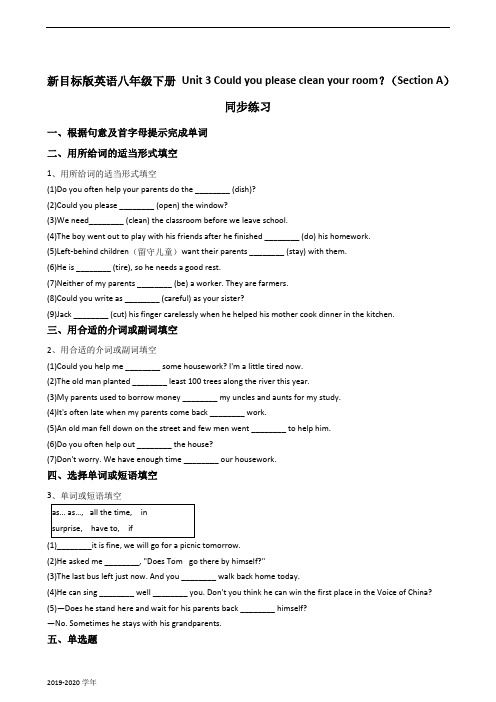Unit3 Could you please clean your room Section A 1
- 格式:ppt
- 大小:4.89 MB
- 文档页数:18

Unit 3 Could you please clean your room?单元教学目标:三维目标:1语言目标:谈论做家务的词汇,及如何有礼貌的提出要求。
2 技能目标:能听懂和谈论做家务的话题;能写出重点单词和重点句型。
3 情感目标:培养学生爱劳动,分享家务的能力。
教学重点短语: do the dishes, make the bed, take out the rubbish, fold the clothes, sweep the floor, clean the living room ……句子:1. Could you please take out the rubbish?. Sure. / Sorry, I can’t. I have to finish homework first.2. Could I use your computer?Sorry. I'm going to work on it now.3. Well, could I watch TV?Yes, you can. But first you have to clean your room.教学难点:Make polite requestsAsk for permission课时划分:Period 1 Section A 1a – 2dPeriod 2 Section A 3a-3cPeriod 3 Section A Grammar focus-4cPeriod 4 Section B 1a-2ePeriod 5 Section B 3a-self checkSection A1 (1a – 2d)三维目标:1知识与技能:1〕重点单词和词组2〕使用could 做出礼貌要求和请求许可。
2.过程与方法:通过合作探究的方法结局本课的重点知识点3.情感态度与价值:学会照顾自己,培养自己的独立意识。
教学重点:谈论做家务的词汇,情态动词could的使用方法。


初二下学期Unit3的课文翻译UNIT 3 Could you please clean your room?第3单元你能打扫一下你的房间吗?Section AA部分1b Listen.Who will do these chores?Check(√) Peter's mother or Peter.1b 听录音。
谁将要做这些家务?勾出彼得的妈妈或者彼得。
Mom:Peter,we need to clean the house.妈妈:彼得,我们得打扫屋子了。
Your grandma is coming over at seven.你的祖母7点钟就要过来了。
Peter:Sure,but I need to do my homework first.彼得:好的,但我得先做家庭作业。
Mom:OK.Then after you finish your homework,let's clea n up the kitchen.妈妈:好吧。
那你做完家庭作业后,咱们就打扫厨房吧。
I can do the dishes and sweep the floor.Could you please take out t he rubbish?我可以洗餐具和扫地。
你能把垃圾拿出去吗?Peter:Sure,Mom.彼得:好的,妈妈。
Mom:Good.And could you please make your bed an d fold your clothes?妈妈:很好。
你能整理下你的床铺并叠好你的衣服吗?P eter:All right.彼得:没问题。
Mom:And let's see...I have to clean the livi ng room before your grandma arrives.妈妈:让我想想……我得在你祖母到之前打扫好客厅。
2a Listen.Peter asks his father if he can do four thin gs.2a 听录音。

新目标版英语八年级下册Unit 3 Could you please clean your room?(Section A)同步练习一、根据句意及首字母提示完成单词二、用所给词的适当形式填空1、用所给词的适当形式填空(1)Do you often help your parents do the ________ (dish)?(2)Could you please ________ (open) the window?(3)We need________ (clean) the classroom before we leave school.(4)The boy went out to play with his friends after he finished ________ (do) his homework.(5)Left-behind children(留守儿童)want their parents ________ (stay) with them.(6)He is ________ (tire), so he needs a good rest.(7)Neither of my parents ________ (be) a worker. They are farmers.(8)Could you write as ________ (careful) as your sister?(9)Jack ________ (cut) his finger carelessly when he helped his mother cook dinner in the kitchen.三、用合适的介词或副词填空2、用合适的介词或副词填空(1)Could you help me ________ some housework? I'm a little tired now.(2)The old man planted ________ least 100 trees along the river this year.(3)My parents used to borrow money ________ my uncles and aunts for my study.(4)It's often late when my parents come back ________ work.(5)An old man fell down on the street and few men went ________ to help him.(6)Do you often help out ________ the house?(7)Don't worry. We have enough time ________ our housework.四、选择单词或短语填空3、单词或短语填空(1)________it is fine, we will go for a picnic tomorrow.(2)He asked me ________, "Does Tom go there by himself?"(3)The last bus left just now. And you ________ walk back home today.(4)He can sing ________ well ________ you. Don't you think he can win the first place in the Voice of China?(5)—Does he stand here and wait for his parents back ________ himself?—No. Sometimes he stays with his grandparents.五、单选题4、If Nancy ________ the exam, she will go to Australia for English study.A、passB、passedC、passesD、will pass5、Last year I ________ drive. I used to take the bus.A、couldB、couldn'tC、shouldn'tD、should6、—Can you finish________ these books before 10 o'clock?—Yes, I can.A、to readB、readC、readsD、reading7、—What do you usually do ________ your parents aren't at home?—I do my homework. Sometimes I watch TV or play computer games.A、becauseB、whileC、butD、before8、Peter likes pop music, but ________ his father ________ his mother likes it.A、both, andB、not only; but alsoC、neither; norD、either, or9、—Can I ________ your bike?—With pleasure. But you mustn't ________ it to others.A、lend, borrowB、borrow, lendC、lend; lendD、borrow; borrow10、Peter speaks Chinese well indeed, but of course not ________ a local speaker in China.A、so fluently asB、more fluent thanC、as fluent asD、much fluently than11、—Could I borrow your camera?—________, but please give it back by Saturday.A、I'm sorryB、Of courseC、Certainly notD、No, thanks12、—Where can I find a ________ hall to hold so many people?—There is one in the tall building.A、small enoughB、big enoughC、enough smallD、enough big13、—__ __?—No problem.A、Did you have a penB、What time did you get up this morningC、Could you help me with houseworkD、How often do you visit your parents六、根据句意,将下列句子中的画线部分译成汉语或英语14、根据句意,将下列句子中的画线部分译成汉语或英语(1)The boy often helps his parents take out the rubbish when he is free.________(2)My daughter can make the bed well without any help.________(3)Don't stay out late, or I will worry about you.________(4)It's good for you to help out around the house after school.________(5)He 扔下his bag and ran away.________(6)一……就…… the bell rang, the children ran out of the classroom. ________(7)A rich woman often带着狗去散步in the park after supper.________(8)Are you和你的朋友闲逛?________(9)Almost everyone wants to拥有一个干净而舒适的家。


Unit 3 Could you please clean your room?第一课时Section A (1a-2d)学习目标1.掌握重点词汇:do the dishes, sweep the floor, take out the trash. fold your clothes, clean the living room, do chores, have to do sth, like to do (doing) sth, make dinner, make your bed,stay out late, work on the computer, get a ride2.学习提出礼貌的请求和请求允许;3.学会使用句型Could you please...?和Could I...?重难点1.掌握一些家务活动相关的动词短语。
2.掌握情态动词could的用法和助动词do的用法。
自主预习1 试读并记忆本课时单词,2 查阅下面的短语动词1) 出去吃饭_______________ 2)在外面待到很晚_______________3)去看电影_______________ 4)搭车_______________5)完成做某事_______________ 6)干净整洁_______________7)洗餐具_______________ 8)倒垃圾_______________9)叠衣服_______________ 10)扫地_______________合作探究1. —Peter, could you please take out the trash?请你把垃极倒掉好吗?—Sure, Mom.可以,妈妈。
—Could you please do the dishes? 请洗盘子好吗?—Sorry, I can’t. I have to do my homework.抱歉,我不能。
我得做作业。
Unit3 Could you please clean your room?Section A (1a-1c) 教学反思瑞华实验学校授课老师:余清本节课选自人教版新目标英语八年级上Unit3 Could you please clean your room的第一课时,属于听说课。
本课的重点知识是学习一些关于清洁的常用动词短语和委婉地提出请求、征求许可做某事的表达方式。
从整体来看,本节课实现了既定的教学目标,师生互动,生生互动良好,课堂气氛活跃,是比较成功的一节课。
为了进一步提高自己的教学水平,下面就本节课的优点和不足做一反思,总结如下。
一、本节课的优点1.图片导课,很好地激发了学生的学习兴趣。
导课环节,我采用了一张“脏乱差”的房间图片,从视觉上冲击的学生的眼球。
从而自然地引出了Could you please clean your room?这个话题。
紧接着我我给出了两张小蜗牛打扫厨房和卧室的动作图片,引起了学生极大的兴趣,营造出了轻松愉快的课堂气氛,2. 课堂活动丰富,游戏设置,让学生松紧由度,寓乐于学。
在学完这些做家务的短语时,机械的反复操练必然会让学生感到无聊。
所以在学生早自习预习之后,老师呈现这些短语时,简单带读一遍过去,便设置了第一个读的简单游戏,要求学生按这些短语出现在第几,学生就将这个短语读几遍。
这样要求学生注意力高度集中,不能读错。
第二个游戏是考眼力的。
要求学生在规定时间内记忆这些短语代表的图片所在位置。
学生在玩得时候感觉很新奇,兴致较高。
3.听说读写在课堂上都有,操练到位。
虽说本节课是听说为主,在训练学生的听力能力时,我除了使用教科书上给出的表格选择题,学生积极地参与了对话练习,还在当堂测练环节设置了口答与写句子的题目,内容是先说出与清洁相关的动词短语和与“Could you please…”两个句子,这样让学生又加强了本节课重点知识的练习。
4.机会平等,让学生成为主体动起来。